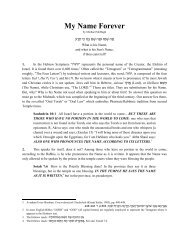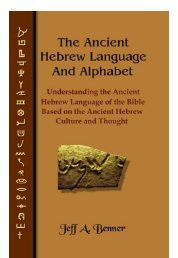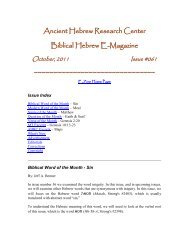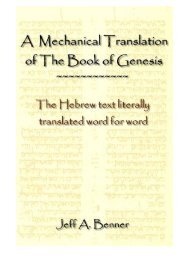Dating the Book of Job (PDF) - Ancient Hebrew Research Center
Dating the Book of Job (PDF) - Ancient Hebrew Research Center
Dating the Book of Job (PDF) - Ancient Hebrew Research Center
Create successful ePaper yourself
Turn your PDF publications into a flip-book with our unique Google optimized e-Paper software.
<strong>Dating</strong> <strong>the</strong> <strong>Book</strong> <strong>of</strong> <strong>Job</strong> 37<br />
place. Elihu was <strong>the</strong> youngest <strong>of</strong> those who were alive at <strong>the</strong> time and his ancestral line back to<br />
Jacob is <strong>the</strong> longest. Elihu’s ancestor Hezron was alive before Israel went to Egypt (Genesis 46:12)<br />
but <strong>the</strong>re is no mention <strong>of</strong> Hezron’s son Ram in <strong>the</strong> list <strong>of</strong> those who went to Egypt with Israel so,<br />
at a minimum, Ram was born in 1385 - 65 = 1320 BC. At a minimum, <strong>the</strong> age <strong>of</strong> Ram at <strong>the</strong> birth<br />
<strong>of</strong> Barachel was 15 years. Likewise, a minimum age for Barachel at <strong>the</strong> birth <strong>of</strong> Elihu would be<br />
15 years. Elihu himself, at a minimum, would have had to have been about 10 years old when <strong>the</strong><br />
events <strong>of</strong> <strong>Job</strong> took place. 1320 - 15 - 15 - 10 = 1280 BC. So, <strong>the</strong> minimum age for Eliphaz when <strong>the</strong><br />
events <strong>of</strong> <strong>the</strong> book <strong>of</strong> <strong>Job</strong> took place would be 1365 - 1280 = 85 years. Because <strong>Job</strong>/<strong>Job</strong>ab was two<br />
generations from Eliphaz, he would have been at least 30 years younger than Eliphaz. Because <strong>Job</strong><br />
lived ano<strong>the</strong>r 70 years after <strong>the</strong> events <strong>of</strong> <strong>the</strong> book <strong>of</strong> <strong>Job</strong> took place (<strong>Job</strong> 42:16), he was probably<br />
in his mid-thirties to early fourties at <strong>the</strong> most. Supposing that Eliphaz was 85 to 95 years old when<br />
<strong>the</strong> events <strong>of</strong> <strong>the</strong> book <strong>of</strong> <strong>Job</strong> took place, <strong>the</strong> book <strong>of</strong> <strong>Job</strong> would be chronicling events that took<br />
place between 1280 and 1270 BC – about 100 years before <strong>the</strong> Exodus.<br />
As explained in <strong>the</strong> below excerpt, it is also evident from <strong>the</strong> text <strong>of</strong> <strong>the</strong> book <strong>of</strong> <strong>Job</strong> itself that<br />
it is older than any o<strong>the</strong>r book <strong>of</strong> <strong>the</strong> Bible.<br />
Excerpted from ancient-hebrew.org: Biblical <strong>Hebrew</strong> E-Magazine – Issue #019:<br />
Q: What is <strong>the</strong> Oldest book <strong>of</strong> <strong>the</strong> Bible?<br />
A: The books <strong>of</strong> <strong>the</strong> Bible are not arranged in a chronological order. The books <strong>of</strong> Genesis, Exodus, Leviticus,<br />
Numbers and Deuteronomy are, by tradition, believed to be written by Moses and are usually believed to be<br />
<strong>the</strong> oldest books <strong>of</strong> <strong>the</strong> Bible. But this is not <strong>the</strong> case. The book <strong>of</strong> <strong>Job</strong> is <strong>the</strong> oldest book, some even believing<br />
it was originally written before <strong>the</strong> flood. The most compelling evidence for <strong>the</strong> antiquity <strong>of</strong> <strong>the</strong> book <strong>of</strong> <strong>Job</strong><br />
is its use <strong>of</strong> <strong>Hebrew</strong> words. In many cases <strong>the</strong> more ancient, concrete meaning <strong>of</strong> a word is found in <strong>the</strong><br />
book <strong>of</strong> <strong>Job</strong>. As an example <strong>the</strong> <strong>Hebrew</strong> word “pachad” is used to mean fear or awe an abstract concept but is<br />
used in its concrete form only in <strong>Job</strong> 4:14 – “dread came upon me, and trembling, which made all my bones shake”.






